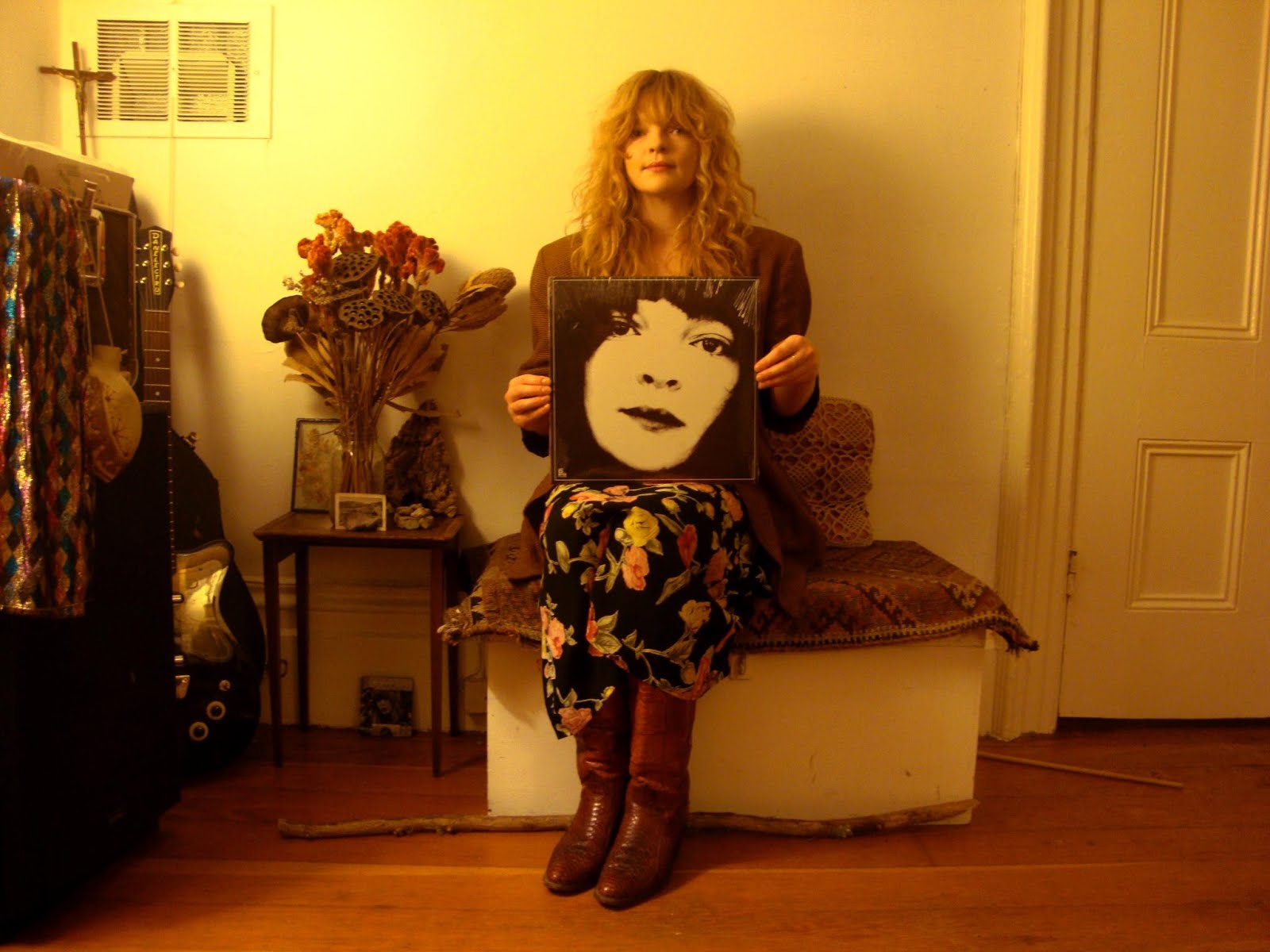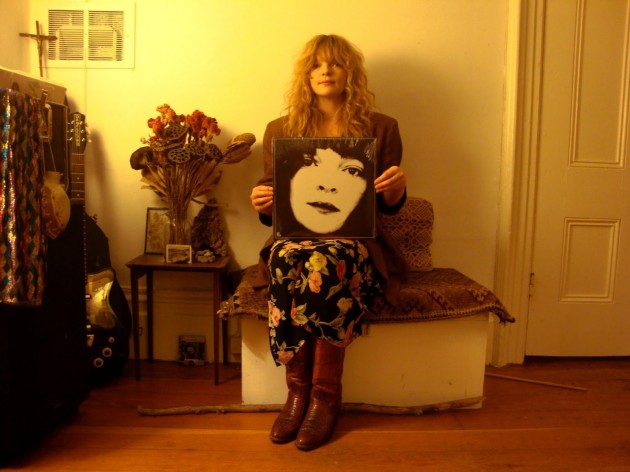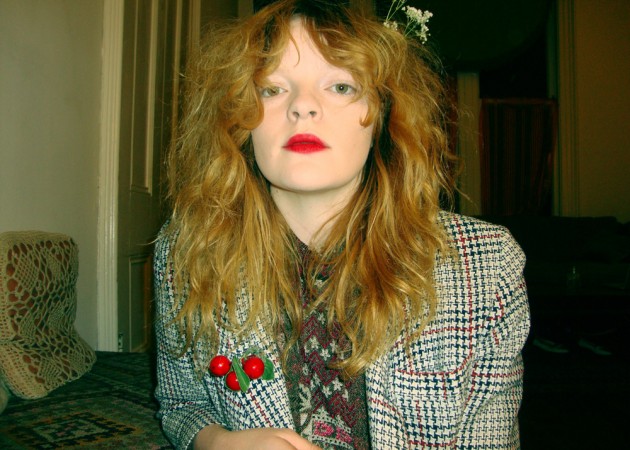Jessica Pratt writes honest songs that vibrate and shimmer with a kind of effervescent emotion that is becoming all too uncommon these days. Her songs appear to be simple, and on first listen, the skeletal instrumentation which houses her voice seems to confirm those suspicions. But Pratt is no waifish acoustic castaway. Her songs, despite their apparent frailty, house deep emotions and a deeper wellspring of strength. Her eponymous debut which came out on Birth Records this past November finds the singer casting her lot in with the folk song traditions of artists like Judee Sill and Bridget St. John. Her songs act as both revelation and condemnation in equal measure, sometimes within the same song. And it seems that this candor and directness is no affectation but is a genuine extension of her own unique personality.
Recently Pratt sat down and answered a few questions for Beats Per Minute concerning the recording of debut album, what records she was listening to during that period of time, and what she considers to be the best gift she ever received.
Beats Per Minute: Your debut came out earlier this month on Birth Records, a label which was founded by Tim Presley (of White Fence and Darker My Love) with the sole purpose of releasing this album. How did you come to know Tim? Do you know what the circumstances were that lead up to this decision to found Birth Records to release your record?
Jessica Pratt: At one point Tim’s brother, Sean Paul moved into the house I was living in. I heard him playing White Fence in his room, had no idea what it was, couldn’t place it. I was instantly excited about it. I think I saw him in the house once, didn’t interact with each other at all. Years later, Tim heard my songs and fortunately for me, loved them. I think the discussion of putting it out was pretty immediate after he contacted me.
BPM: Your songs could be considered stripped down in terms of how they use space and a kind of nonchalant effortlessness to convey a depthless sense of emotion. Was there ever a conscious decision to pare back the instrumentation or was this aesthetic choice simply an organic progression for you or was it even thought about like that?
JP: The sparseness of the majority of the songs on the record is really just sort of circumstantial. I had a friend that hooked me up with a couple of sessions at this guy’s recording studio. At the time, I was really just recording the songs for posterity. I didn’t think I’d ever use them for a record. Most of the songs were recorded in 2007 so it’s possible for me to look back on them and be more accepting of their straightforwardness, whereas now with the new songs I’ve recorded, I’ve definitely been adding layers.
BPM: Influences are hard to get away from, even for a record like yours which has a very singular personality. But what were some of your favorite records that you listened to while writing and recording what would eventually become the songs on your debut?
JP: A lot of different stuff. The time I spent writing most of those songs was split up between two different living situations, the first being an apartment in the Tenderloin area of San Francisco and the latter one being a basement floor I shared with my boyfriend and our friend Moses that worked at the record store down the street. I think he had something like 2000 records. Some of my favorites from that time were the first side of Nils Lofgren’s 1 + 1, Paul Williams, the first John Prine record, Strikin’ It Rich by Dan Hicks & His Hot Licks, Michael Hurley, everything by Townes Van Zandt, lotta Todd Rundgren, Wings’ first record, “Wildlife” and I think the top 3 most played records were Paul Simon’s first record, Al Stewart’s Year of the Cat and a collection of british folk guitarist John Martyn’s songs.
BPM: In previous interviews and articles, much has been made of some similarities between your voice and those of particular seminal folk artists. Instead of broaching that subject explicitly, I’ll just ask this: was there anyone you loved singing along to when you were younger, and even now? Someone you felt a connection to while singing?
JP: If we’re talking influences, I’d say my most sung-along to records were definitely Marianne Faithfull, and pretty much all of Gram Parsons’ various incarnations. Also, Love, huge on the Buffalo Springfield and all that dreamy LA 60’s stuff.
BPM: These songs almost sound as though they were recorded as-is. Was there much production applied to them or was it a case of getting that perfect take on the first try?
JP: There’s essentially no post-production on the tracks aside from basic mastering. “Night Faces” and “Dreams” are the newest songs on the record and those have two guitar tracks, some extra vocals and were also two of three songs on the record recorded with a 4 track.
BPM: These songs obviously feel intensely personal. Were you ever concerned that because of their relative simplicity (music-wise) and uncharacteristic directness they wouldn’t resonant as deeply with other people as they did with you? I understand that’s somewhat of a loaded question, as an artist’s own experiences are generally intrinsic to the art being created, but was that ever a concern for you?
JP: Again it was a case of not really thinking of it in the sense of being heard by lots of people. I was just writing songs to maybe play out and hadn’t considered anything beyond that. I definitely wasn’t consciously writing it for anyone else.
BPM: Can you give us a little background on the album’s inception and your musical history as well? How or why did you initially start playing music? In regards to the album, which song here on the album (or possibly not here) led you to begin recording?
JP: I started playing my brother’s guitar when he got bored with it when I was about 14. My mom taught me how to play all the basic chords, and she had a little lyrics and chords booklet she had made of some of her favorite songs, some CSN&Y, John Lennon, T.REX. I learned how to play a lot of those and was just so into music as a young teenager; it’s all I thought about. I thought I could maybe be good at it.
BPM: Was there ever a specific moment in your life where you thought, “Yeah, this is it. Let’s do this.” in regards to pursuing music as a career or even more than just a passing interest?
JP: I don’t know if I ever experienced one defining, cinematic moment, but there was definitely a moment when I realized that having music as a main goal wasn’t impossible and that if I could I would definitely do that above anything else.
BPM: And I’ve got to ask, “Dreams” feels so wonderfully rustic and that’s in part due to the contrasting trade-off in vocal duties, who is singing with you on that track? (And please tell me it’s not Presley or I’m going to feel like an idiot). What led to this duet of sorts?
JP: The deeper “man’s” vocals on that track are actually just me. The song’s pitch was turned down a bit, so the lower harmony sounds masculine.
BPM: Let’s set aside music for a moment since we’re heading into the holidays. Where do you stand on the issue of fruitcake as a viable Christmas food? And have you ever re-gifted a fruitcake?
JP: I actually like fruit cake. I think I’ve only ever had other family’s fruit cakes, though. I’ve never gifted one.
BPM: What was the best gift you ever received? The worst?
JP: Best gift I’ve ever received was this almost literally impossible to find record by the GTO’s called Permanent Damage. Worst gift was a Cardinals keychain from a classmate in the 6th grade when she found out my family couldn’t afford a Christmas tree.
BPM: Thank you for taking time out of your schedule and answering some questions for us. And lastly, do you have any customary holiday plans or traditions?
JP: I don’t really have any traditions aside from Christmas ham.




